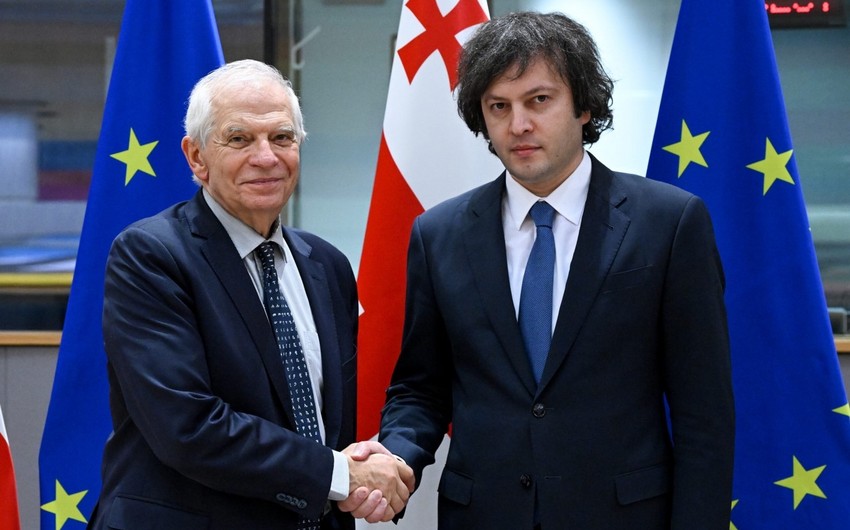The small nation of Georgia is once again at the center of the attention of the European Union.
While the ruling “Georgian Dream” has progressed with its “foreign agents” bill, the EU has decidedly created a new approach to the aspirations of the South Caucasus nation in entering the European Union, by claiming that such a law will only create problems for Georgia in the middle and long terms and its goal of entering the European community might not come to a successful conclusion.
On April 17, the foreign agents law was adopted by the Georgian Parliament in the first reading. The willingness to vote for this initiative was not influenced by the pressure of European politicians and diplomats, claiming that this initiative contradicts the values of the EU and will be a problem for the European integration of Georgia.
A year ago, the ruling party "Georgian Dream" already tried to pass the law "on foreign agents", but after passing it in the first reading, it was forced to give in to pressure from the West. However, within a year, the Georgian government took into account the fact that the relations between the EU and Georgia did not improve amid the compromise made by Tbilisi and pushed through with their initiative, with several slight modifications.
"In 2022, non-governmental organizations openly joined the campaign to open a second front. In the first days after the start of the war, they demanded sanctions against the Russian Federation and the sending of volunteer fighters to Ukraine with the approval of the government... I am convinced that if the law "On transparency of foreign influence" was introduced into action, these organizations would refrain from war propaganda and would not put their donors in an uncomfortable position", - this is how Georgian Prime Minister Iraklii Kobakhidze explained the need to approve the draft of the law.
According to him, those non-governmental organizations that "openly engage in LGBT propaganda" and those that "brazenly attack the Orthodox Church" oppose this law.
Such an approach created a strong reaction from Brussels. "The European Union calls on Georgia to refrain from adopting legislation that could jeopardize Georgia's path to the EU - a path supported by the vast majority of Georgian citizens," said a joint statement by the High Representative of the European Union for Foreign Affairs and Security Policy, Josep Borrell, and the European Commissioner for European Affairs. neighborhood and enlargement policies by Olivér Várhelyi.
Despite the open warnings from European politicians, the Georgian government has set its mind on completing the task at hand and claims it will not be forced to define its own Internal policy through the pressure of the EU institutions.
"Not a single argument against the law was given, zero arguments. They say that the law contradicts European values. In which part, in which article, why? Zero arguments" commented Prime Minister Kobakhidze on criticism of the West.
"Nothing will be able to prevent the protection of state sovereignty and, therefore, the final adoption of the law. To Europe - with dignity, transparency, and sovereignty. This is our motto and spirit," he clarified.
While the European Union and the Georgian government are at odds over the law introduced by the “Georgian Dream”, the Georgian politicians are seemingly taking a proactive stance. To them, the threats to the EU accession from Brussels seem to be empty, as the procedure itself is taking too much time and can be too protracted.
“Last December, we became a candidate country. The next step is joining,” Irakli Garibashvili told reporters on Saturday. “Today, we are not ready to become a member country.”
Georgian Dream politician and former prime minister also defended the new bill that would label NGOs, campaign groups, and media outlets that receive more than 20 percent of their funding from abroad as agents of foreign influence. Critics say the legislation would drive a wedge between Georgia and the West.
“If we are told that tomorrow we will become a member of the EU, then it will be possible to very easily cancel it, revise, transform or adopt a new law,” Garibashvili said.
At the same time, he claimed that “there is no consensus a country can become a member of the EU today” because the bloc “is not ready for enlargement and it will take time and these next steps depend on many things.”
With the new round of tensions between the two sides, it seems clear that the Georgian government is going to defend its right to impose principles of sovereign politics. To many in the government circles in Tbilisi, the EU position on Georgia seems to be ineffective and unjust.
While Ukraine and Moldova have progressed in their accession talks on the EU membership, the Georgian government feels that Brussels is taking too much time on Tbilisi’s accession plans as well as trying to implement and interfere in the internal Georgian affairs without providing any guarantees or benefits to the country that aspires to enter the European Union. Such an approach creates a divide between the two parties and leads to the distance in their respective interests.
Adil Malikov


 https://static.report.az/photo/5614bdb6-7b24-3e55-91ed-0a9095c90ffa.jpg
https://static.report.az/photo/5614bdb6-7b24-3e55-91ed-0a9095c90ffa.jpg

